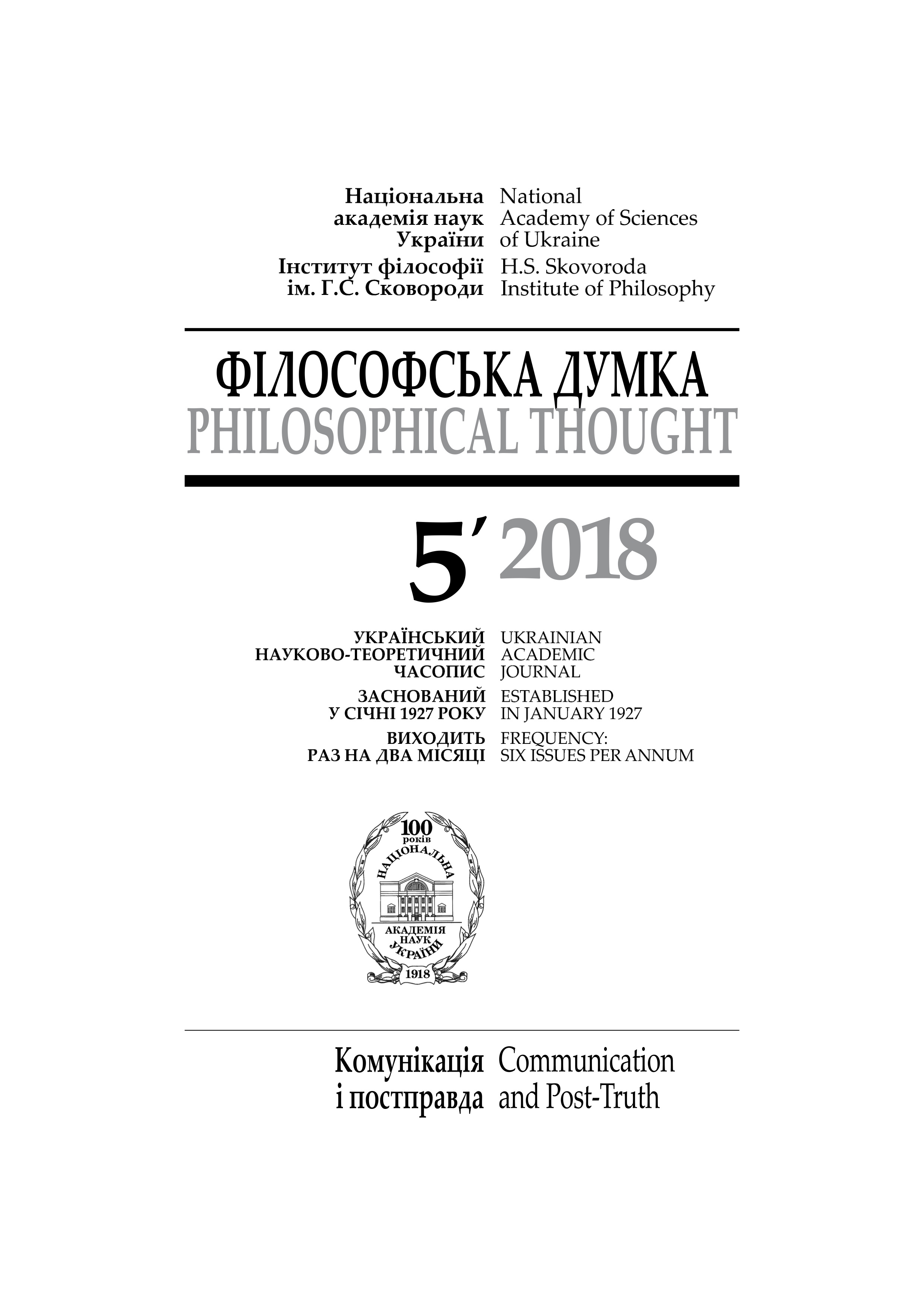The crisis of democracy and the effect of public discourse
Keywords:
The crisis of democracy, political participation, governance, discourse, delibera- tive democracy, common good, public intellectualAbstract
The article analyzes the contemporary crisis of democracy as one of the key factors in the socio-political situation of the global world. A substantive separation between critical reflection on the effectiveness of mechanisms, procedures and other elements of govern- ment, which constitutes an inseparable dimension of democratic life, and the actual crisis of democracy as a way of self-organization of society, is conducted. Two versions of this crisis are distinguished: (1) the denial of a democratic system by other socio-political sys- tems (first of all totalitarian regimes); (2) the loss of democracy by virtue of the pressure of internal problems and conflicts in the development of society. The devastation of the con- temporary crisis of democracy lies in the crisis of political participation of citizens in the process of governance and, in general, the exercise of power functions. That is why, first of all, the crisis of the representative form of democracy. Among the ways of overcoming it, the emphasis is on the mechanisms of direct democracy, which ensures the involvement of citi- zens in government practices. Proceeding from the drawbacks of traditional forms of direct democracy (in particular, plebiscite), a model of deliberative democracy is proposed, which organically combines the expansion of opportunities for citizen participation in government with the neutralization of manipulative technologies of public communication. The com- plex of requirements for public discourse is substantiated so that he could answer the tasks of deliberative democracy (criteria of authenticity of a discourse). A special role in it must be played by the media of discourse — a public intellectual. Based on these theoretical foun- dations, the state and problems of public discourse in Ukraine are analyzed. This allows us to determine the prospect of a deliberative democracy in Ukrainian society.
References
Aristotle (2000). Policy. [In Ukrainian] Kyiv: Osnovy. [=Арістотель 2000]
Aron, R. (1993). Democracy and totalitarism. [In Russian] Moscow: Text. [=Арон 1993] Habermas, J. (2005). Three normative models of democracy. [In Ukrainian] In: Democracy
(pp. 364-372). Kyiv: Smoloskyp.
Democracy in Europe: a crisis and prospects (2010). Resolution PACE #1746. Derived from:
http://www.andigross.ch/html/DemEuroRuss.pdf. [=Демократія 2010]
Castells, M. (2000). Information Age: economy, society and culture. [In Russian] Moscow:
SU HSE. [=Кастельс 2000]
Carsten, F., Beckman, K. (2016). Beyond Democracy: Why democracy does not lead to solidar-
ity, prosperity and liberty but to social conflict, runaway spending and a tyrannical govern- ment. [In Russian] Moscow: Create Space Independent Publishing Platform. Derived from: https://truthrus.wordpress.com/2015/11/26/beyond-democracy. [=Карстен 2016]
Crozier, M., Huntington, S., Watanuki, J. (1975). Crisis of democracy. Report on the Governability of Democracies to the Trilateral Commission. [In Ukrainian] Derived from: http://www.iarex. ru/articles/52589.html. [=Круазьє 1975]
Mannheim, K. (1994). Ideology and utopia. [In Russian] In: K. Manheim, The Diagnosis of Our Time (pp. 7–276). Moscow: Yurist. [=Манхейм 1994]
Mill, J.S. (2001). Considerations on representative governance. [In Ukrainian] In: J. S. Mil, On Liberty (pp.131–366). Kyiv: Osnovy. [=Мілль 2001]
Naisbitt, J., Aburdene, P. (1992). What Awaits Us in the 1990s. Megatrends. Year 2000. [In Rus- sian] Moscow: Respublika. [=Несбит 1992]
Sennett, R. (2003). The Fall of Public Man. [In Russian] Moscow: Logos.
Tocqueville, A. (1999). Democracy in America. [In Ukrainian] Kyiv: Vsesvіt. [=Токвіль 1999] Fukuyama, F. (2005). The Great Disruption: Human Nature and the Reconstitution of Social Order. [In Ukrainian] Lviv: Kalvarіya. [=Фукуяма 2005]
Fukuyama, F. (1990). The End of History? [In Russian] Voprosy Filosofii, 3, 25–34.
Ferrajoli, L. (2005). The crisis of democracy in the era of globalization. In: Law and justice in a global society (pp. 53–59). Granada, Espana. Derived from http://elar.urfu.ru/bitstream/10995/4388/ 2/sf-05-39.pdf
Downloads
-
PDF (Українська)
Downloads: 649
Published
How to Cite
Issue
Section
License
Authors who publish with this journal agree to the following terms:
- Authors retain copyright and grant the journal right of first publication.
- Authors are able to enter into separate, additional contractual arrangements for the non-exclusive distribution of the journal's published version of the work (e.g., post it to an institutional repository or publish it in a book), with an acknowledgement of its initial publication in this journal.
- Authors are permitted and encouraged to post their work online (e.g., in institutional repositories or on their website) prior to and during the submission process, as it can lead to productive exchanges, as well as earlier and greater citation of published work (See The Effect of Open Access).


